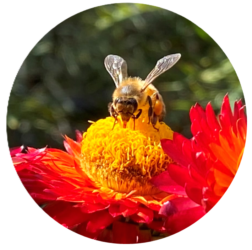- April
The cold weather is at our doors, with Anzac Day commonly considered to be the cutoff date for beekeeping in the region it is important to finalise preparations for wintering your hives very soon.
Take honey off. Pack down your hives and get your varroa tests done asap if you have not already. April is Bee Pest Blitz month so do not forget to check for other pests and diseases, particularly AFB. They are still around.
Coming we have Daniel from the DPI coming to talk to us this month about the sentinel hive program that the club will take part in and of course varroa generally.
Hopefully, we can have a nice mild winter and a better more consistent honey flow next season. - March
Beekeepers should start thinking about packing down for winter,
Remove excess Honey, pack down the hive and store frames for winter.
Get your pre-winter Varroa Mite inspection done and reported to the DPI.Thinking Bio Security, we have Mike Allerton from the ABA speaking in March and Daniel Martin from the DPI speaking in April meetings.
- February
The southern highlands honey flow is patchy, some beekeepers reporting good yields, others are still waiting for capped honey in hives. Going into winter it will be important to check and support hives that have not stored honey for winter.
Regarding Varroa Mite, it may not arrive in southern highlands until after spring when hive movements and swarms are more likely to occur. - December
The current dry weather has resulted in some hit / miss honey flows, members are advised to check their hives for starvation and feed if necessary.
Varroa mite check would be due in December, however, do not forget to check for other pests and diseases.
Hoping that everyone has a safe and merry Christmas.

